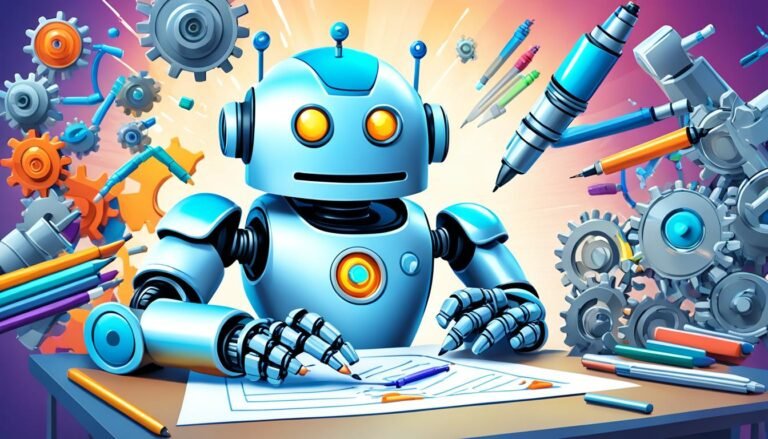ChatGPT Consulting: How to Leverage AI for Business Success
Are you ready to change your business with artificial intelligence? ChatGPT consulting is changing how companies work, market, and grow today. Since it started in November 2022, it has become very popular and powerful, helping all kinds of businesses.
Natural language processing and AI are now key for staying ahead. ChatGPT lets businesses work more efficiently, be more creative, and connect better with customers. It can do everything from simple tasks to creating new content.
But, using AI wisely is important. It brings many benefits but also risks. That’s where ChatGPT consulting helps, guiding businesses through the AI world and making smart choices.
Key Takeaways
- ChatGPT consulting is reshaping business operations across industries
- AI adoption can lead to significant time and cost savings
- Combining AI-generated content with human expertise is crucial
- AI proficiency is key to thriving in the modern business landscape
- Ethical considerations are vital when implementing AI solutions
Understanding the AI Revolution in Business
The AI revolution is changing the business world. Language models and GPT training have led to big steps forward. ChatGPT, for example, quickly got over a million users in just five days. This shows how much interest there is in AI across different fields.
The emergence of generative AI and ChatGPT
Generative AI, like ChatGPT, is changing how businesses work. These AI tools can make text, images, and even proteins. Companies are looking into using AI in marketing, sales, and research and development.
Impact on small and medium-sized enterprises
Small and medium-sized enterprises (SMEs) can also benefit from AI. AI consulting services help these businesses grow. By using AI chatbots, SMEs can better support their customers.
This can make customers happier and more loyal to the brand.
AI as a strategic imperative for growth
Using AI is becoming key for businesses to grow. Companies that start early can innovate faster and give better customer experiences. But, it’s important to use AI wisely.
Teams should think about the risks and make rules for using AI responsibly.
| AI Application | Business Impact |
|---|---|
| Customer Service Chatbots | Improved customer satisfaction |
| Predictive Analytics | Better decision-making |
| Quality Control Systems | Enhanced product quality |
| Content Generation | Increased marketing efficiency |
As AI keeps getting better, businesses need to keep up to stay ahead. The AI revolution brings new chances for growth and innovation in every field.
ChatGPT Consulting: Transforming Business Operations
AI is changing how businesses work in many fields. ChatGPT and other NLP tools are leading this change. Companies like Affirma are at the forefront, helping businesses use these tools well.
Prompt engineering is key to getting the most out of AI assistants. By making precise prompts, businesses can unlock ChatGPT-4’s full power. This AI model is great at tasks like translating, summarizing, and creating text.
AI adoption is growing fast. ChatGPT is the fastest-growing app, marking a new era in business. These tools have many uses:
- Data analysis
- Natural language processing
- Process automation
- Personalization
- Product development
Consulting firms like Opace help businesses add AI to their workflows smoothly. They offer help in prompt engineering, AI consultancy, and digital marketing. Their strategy combines AI with human skills to innovate and solve tough problems.
| AI Consulting Benefits | Impact on Business |
|---|---|
| Time savings on routine tasks | More focus on innovation |
| Cost reduction | Increased investment in strategic projects |
| Improved efficiency | Enhanced competitiveness |
By working with AI consultants, businesses can stay ahead in the fast-changing AI world. The goal is to use AI to enhance human insights, not replace them. This way, businesses can fully benefit from AI while keeping their edge.
AI-Powered Customer Service and Engagement
AI is changing customer service for the better. It gives businesses tools to improve how they engage with customers. Now, companies can offer personalized experiences that meet what customers want.
Implementing AI Chatbots for Customer Support
AI chatbots are making customer support better. They can answer many questions quickly. This lets human agents focus on harder tasks.
The results are clear:
- 44% of enterprises now offer 24/7 help through AI
- 37% report faster response times
- 29% see improved overall customer experiences
Personalizing Customer Interactions with AI
AI is great at understanding customer data. It helps businesses tailor their approach. This makes interactions more personal.
- 62% of customers prefer personalized recommendations
- 71% seek natural, conversational interactions
- 65% expect businesses to adapt to their changing preferences
Enhancing Customer Experience through Predictive Analytics
Predictive analytics powered by AI can guess what customers need. This leads to better support and engagement. The results are impressive:
| Metric | Improvement |
|---|---|
| Customer Experience (CX) | 61% of companies see improvements |
| Customer Satisfaction (CSAT) scores | 58% of companies report enhancements |
| KPIs and SLAs achievement | 66% of businesses meet or exceed targets |
Using AI in customer service makes experiences better. It meets customer needs and builds loyalty. This is key in today’s competitive market.
Leveraging AI for Data-Driven Decision Making
Businesses are using AI to change how they make decisions. With AI consulting, they can find valuable insights in big data. This helps them innovate and stay ahead. Natural language processing lets machines understand human language, making data analysis easier and faster.
AI is changing how companies analyze data and make decisions. For example, AskYourDatabase makes working with databases easier. TEXT2SQL.AI turns natural language into SQL queries. This lets non-tech people get useful insights from big datasets.
The effect of AI on decision-making is big:
- AI algorithms predict future trends using past data and market conditions
- Real-time insights improve many business operations
- Automation of routine tasks saves time for more important work
- AI-driven self-service analytics help employees learn and use analytics daily
Using AI for data-driven decisions helps companies spot and fix problems quickly. This leads to ongoing improvement and growth. It also makes businesses more efficient by combining human and machine skills.
| AI Tool | Function | Impact |
|---|---|---|
| TensorFlow | Predictive analytics | Builds and deploys predictive models |
| ChatGPT | Content generation | Helps create marketing content and blog articles |
| AskYourDatabase | Database interaction | Makes SQL and NoSQL database queries simpler |
AI in Marketing and Content Creation
The marketing world is changing fast, thanks to AI. GPT training and NLP are making a big difference in content creation and marketing plans.
AI-assisted Content Generation and Optimization
AI tools like ChatGPT are changing how we make content. With over 1.8 trillion parameters, ChatGPT helps with ideas, outlines, and writing. About 72% of marketers use generative AI, showing its big role in marketing.
Tailoring Marketing Strategies with AI Insights
AI platforms look at lots of data to make marketing more personal. Email marketing tools use AI to sort audiences and tailor messages. Search engines use AI to rank websites and show ads, making marketing better.
Automating Social Media Management
Social media management gets a big boost from AI. These tools plan posts, check engagement, and even come up with content ideas. This saves time and makes social media plans more effective.
“AI tools have become more accessible and affordable for marketers due to advances in cloud computing, natural language processing, and machine learning.”
AI brings many benefits, but it has its limits. AI tools can make mistakes, with a hallucination rate of up to 27%. Human creativity and knowing the audience are still key to making great marketing campaigns.
Streamlining Operations with AI-Driven Automation
AI-driven automation is changing how businesses work. It’s used in many fields, from healthcare to retail. AI assistants are making tasks quicker and more precise.
Robotic Process Automation (RPA) is leading this change. Tools like UiPath, Robocorp, and Worksoft automate routine tasks. This lets humans focus on more complex jobs. Already, over half of companies use AI for tasks that humans used to do.
AI is also great at understanding language. Intelligent Document Processing (IDP) can read documents and pull out information. This saves a lot of time on manual data entry. Kofax and ABBYV are at the forefront of this technology.
Here’s a quick look at how AI is streamlining different areas:
- Customer Service: AI chatbots handle routine inquiries
- Data Analysis: AI tools process vast amounts of data quickly
- Decision Making: Predictive AI informs strategic choices
- Content Creation: Generative AI assists in producing new material
The results are impressive. For example, in loan processing, AI and RPA can automate about 90% of the work. This makes loan applications faster and more accurate. AI-driven automation is a key tool for success in today’s fast world.
Ethical Considerations and Challenges in AI Adoption
Businesses are diving into AI consulting services, but they face big ethical questions. The new language models offer chances and hurdles for companies aiming to use AI for success.
Addressing AI Bias and Transparency
AI systems can carry biases from their training data. Companies must make sure their AI is fair and unbiased. They should use diverse data sets. It’s also key to be open about how AI makes decisions to gain trust from customers and employees.
Ensuring Data Privacy and Security
Keeping sensitive data safe is critical when using AI. Businesses need strong security to protect data in AI models. This includes using encryption, setting up access controls, and watching AI system performance closely.
Navigating the Human-AI Balance in the Workplace
As AI gets better, finding the right mix of automation and human skills is vital. Companies should invest in training employees for new roles. This helps avoid negative effects and prepares for an AI-driven future.
| Ethical Challenge | Potential Solution |
|---|---|
| AI Bias | Use diverse training data and regular bias audits |
| Lack of Transparency | Implement explainable AI techniques |
| Data Privacy Concerns | Adopt strict data protection policies and encryption |
| Worker Displacement | Invest in reskilling and creating new AI-related roles |
By tackling these ethical issues, companies can use AI effectively. This way, they can keep their operations trustworthy and honest.
Implementing AI: Best Practices for Businesses
Businesses are increasingly using AI, and it’s key to do it right. A survey found that 50% of companies use AI in at least one area. To get the most out of AI, focus on prompt engineering and NLP applications.
Begin with a pilot project to test AI. This lets teams aim for clear goals in a small way. For example, 55% of companies have AI in one area, and 39% are testing it.
Do a thorough AI readiness check. Look at your team’s skills, tech setup, and resources. Also, think about the costs of developing, buying, and keeping AI running.
- Understand AI capabilities and limitations
- Explore various AI applications
- Recognize continuous AI evolution
- Acknowledge the necessity of human oversight
Talk to important people and really understand your processes. Pick the best use cases, set clear goals, and expect a good return on investment. Remember, 97% want to use AI in their products, but only 14% feel ready.
“Starting with a committee approach, involving diverse perspectives from sales, operations, risk, compliance, and legal, is crucial for successful AI implementation.” – Deloitte
By following these steps, businesses can use AI to innovate, work better, and stay ahead in the digital world.
Future Trends in AI and ChatGPT Consulting
The AI world is changing fast, shaping the future of business consulting. The global AI consulting market is expected to grow by 35.9% from 2021 to 2028. This growth comes from more businesses using AI, with a third already using generative AI.
Emerging AI Technologies and Their Potential Impact
Conversational AI, like ChatGPT, is changing how we talk to customers and run businesses. For example, INSEAD’s TotoGEO AI lab has made 1.2 million market reports. This shows AI’s power in making insights at a large scale.
This trend shows we need AI that fits each industry’s needs. It’s about finding the right AI for each sector.
Preparing for the Evolving AI Landscape
As AI use grows, businesses face new challenges. These include a lack of AI skills (37% of companies) and data problems (31%). To solve these, companies are hiring AI consultants.
They’re focusing on using AI with traditional analytics. This improves decision-making. Language models are key in this, helping us understand data better.
Continuous Learning and Adaptation in AI Consulting
The future of AI consulting is about being adaptable and always learning. Only 13% of AI projects make it to production. Consultants need to create real value.
This change is making pay models more performance-based. AI is making reports easier to make. Now, consultants focus on implementation, managing ecosystems, and sustainability. These areas still need human skills.
Source Links
- ChatGPT & AI for Consultants: What You Need To Know
- Home – ChatGPT Consulting
- Generative AI is here: How tools like ChatGPT could change your business
- AI Revolution: Transforming Businesses with ChatGPT Tools
- The AI Revolution: ChatGPT Spells The End of Management Consulting As We Know It
- ChatGPT Consulting
- ChatGPT Consultant Services | Generative AI Consulting For Business
- AI in Customer Service can Benefit your Business [3 Real Examples]
- How AI is Transforming Customer Support: Smarter Experiences Explained
- AI in customer support: Use cases, solutions, development and implementation
- Ruddr – Blog – How Consulting Firms Can Leverage the Power of Artificial Intelligence
- Revolutionizing Decision-Making: How AI and Data Analytics are Transforming Management Consulting…
- Role of AI Tools like ChatGPT in Content Marketing in 2024
- Content Marketing With ChatGPT: A Comprehensive Guide | Brafton
- The Role of AI in Streamlining Business Processes: A Game Changer in the Business World
- Harnessing the Power of AI Automation for Streamlined Business Operations | NICE
- Business Process Automation and AI: Driving the Future of Efficiency and Innovation
- Generative AI Ethics: 8 Biggest Concerns and Risks
- Ethical Considerations of Using ChatGPT in Health Care
- Ethical Considerations of Using ChatGPT in Health Care
- Business leaders share their best practices when implementing AI
- Council Post: How To Effectively Integrate AI Into Your Business Operations
- How to Implement AI in Business: A Step-by-Step Guide – IT Craft
- The Top 5 Trends Shaping Generative AI Consulting
- AI Trends and Predictions 2024 | Cloudester
- ChatGPT and AI Disruption: Is Consulting Next in Line?







